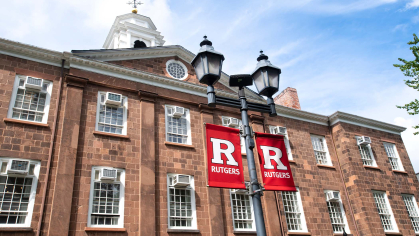Rutgers Board of Governors Approves 2.6 Percent Tuition and Fee Increase
Board approves $4.8 billion 2021-2022 budget following tuition freeze during pandemic
The Rutgers University Board of Governors today approved a $4.8 billion budget that includes a 2.6 percent increase in tuition and fees for the 2021-2022 academic year, following a freeze in tuition and a fees reduction for the past year in recognition of pandemic-related hardships.
“We know that tuition increases are difficult for our students, especially after a challenging year, and we would avoid any increase if the numbers would allow it,” said Mark Angelson, chair of the Board of Governors. “We are committed to providing an affordable, high-quality education, and we urge our students and their families to focus, as we do, on the average net cost to students who receive financial assistance.”
The board approved the 2.5 percent increase in tuition and 2.9 percent increase in mandatory fees for most undergraduate and graduate programs. For the last five academic years, the university averaged a 1.2 percent increase in tuition and fees, including the 2020-2021 tuition freeze and 15 percent campus fee reduction.
“This budget allows us to provide what is most important – excellent academic instruction and research opportunities for our students, first-rate patient care and far-reaching public service while keeping cost increases as low as possible following an extremely difficult year unlike any Rutgers has experienced,” President Jonathan Holloway said.
Tuition and fees, which account for nearly 29 percent of university revenues, help fund academic programs and university services, including academic advising, library services, computing services, student health services, counseling and financial aid.
“This is a prudent budget that addresses our fiscal realities. The fact that we are not yet back to the pre-pandemic ‘normal’ – especially with respect to revenues from housing, dining and similar sources – means that we will still have to keep careful controls on discretionary spending throughout the coming fiscal year,” said Michael Gower, executive vice president, chief financial officer and university treasurer.
For the academic year beginning in September, a typical in-state, full-time arts and sciences undergraduate at Rutgers University-New Brunswick would be billed $15,804 in combined tuition and mandatory student fees. At Rutgers University-Newark, tuition and fees for a typical full-time arts and sciences undergraduate is $15,208, and, at Rutgers University-Camden, a typical arts and sciences undergraduate’s tuition and fees is $15,657.
For nearly 80 percent of Rutgers students, individual costs are reduced by federal, state, private or institutional financial aid, including need and merit-based grants, scholarships and loans.
The estimated average net price to attend Rutgers-New Brunswick for in-state, first-year students receiving scholarship and grant assistance is 56 percent of the total cost of attendance, including tuition, fees, room, board and other expenses, based on previous years’ data. The average net price for a Rutgers-Newark student is estimated to be 49 percent of the total cost and 53 percent for a Rutgers-Camden student.
In addition to tuition and fees, university revenue sources include patient care services (21.8 percent), the State of New Jersey (18.9 percent), sponsored research (13.9 percent) and one-time federal relief funds (1.5 percent). Miscellaneous sources, including student aid, athletics, endowment and investment income, account for 15 percent of revenues.
Nearly 78 percent of the budget funds the university’s core mission of academic instruction, research, public service and patient care, including compensation costs, while 14.5 percent is spent on administration, operations and maintenance. Less than 5 percent funds auxiliary expenses, including housing and dining operations and transportation costs, while athletics spending accounts for 2.8 percent of the budget.


